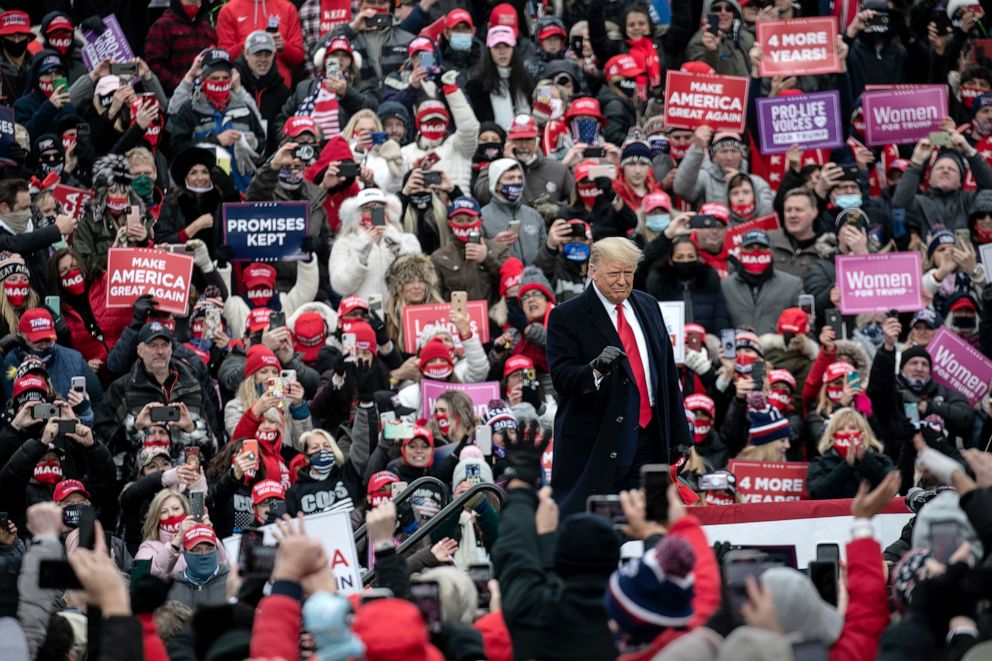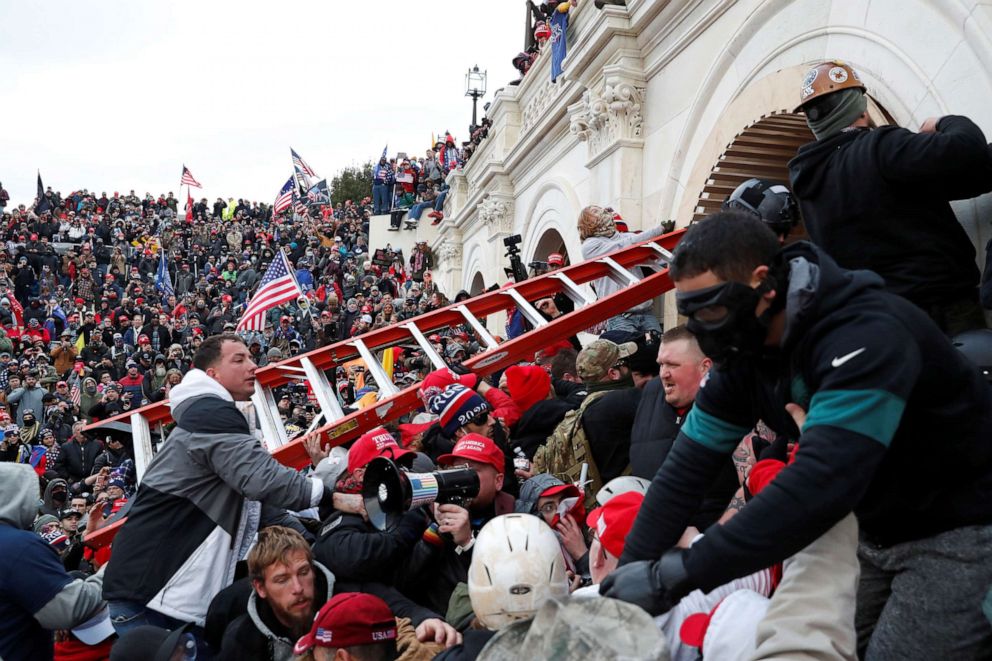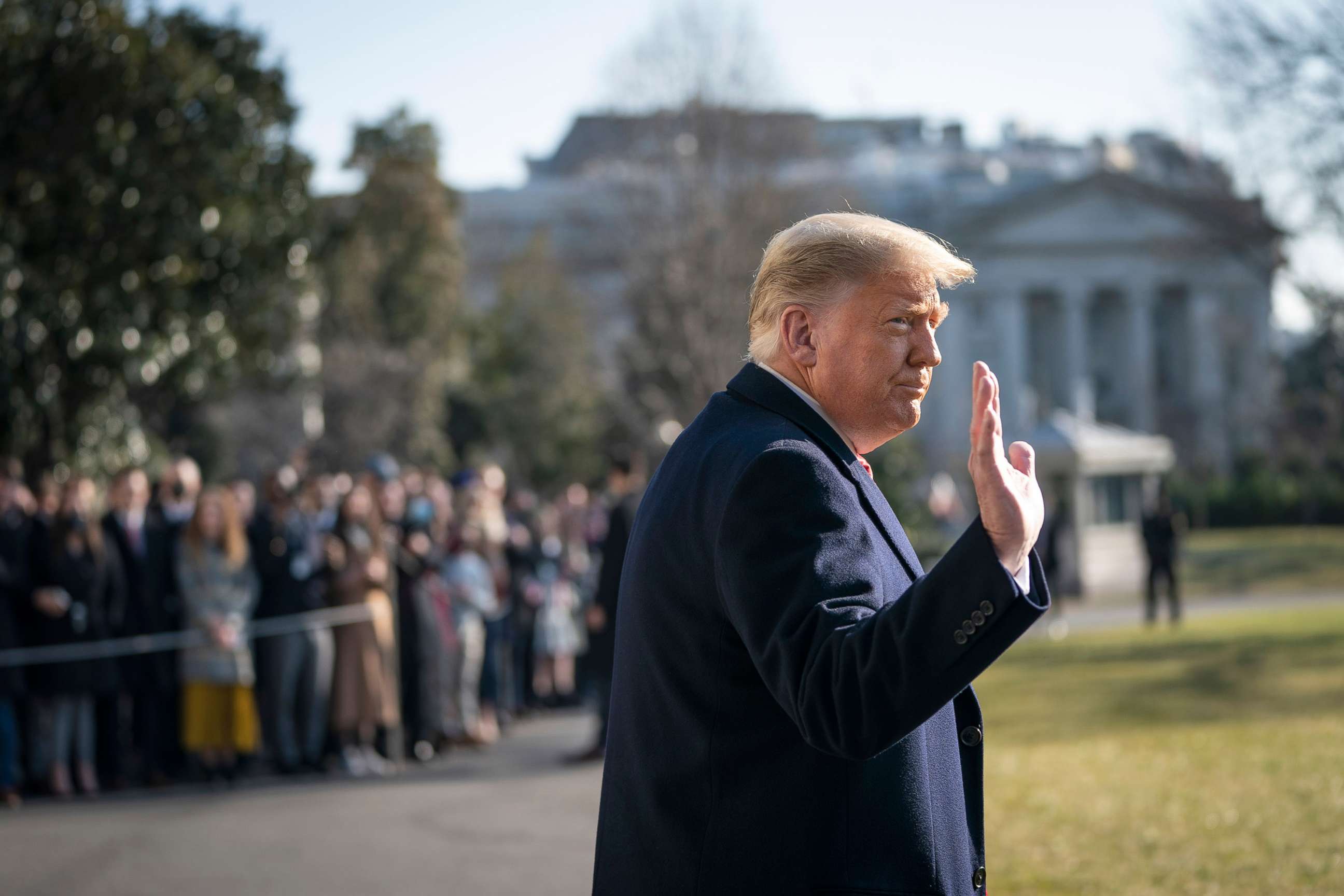Fully break or remain loyal: Republican voters reckon with GOP’s future after Trump
When Doug Peterson first voted for Donald Trump in 2016, and again four years later to reelect him, he felt he was supporting a candidate who "took the bull by the horns" to deliver "for the people," and not for the political establishment.
At the end of a presidency laden with temper tantrums and childish behavior, particularly over the last two months, Peterson said, he would have voted differently the second time -- an about-face that comes shortly after the violent invasion of the U.S. Capitol earlier this month.
"He was too busy with all the false claims about how everything had gone corrupt and they stole the election," the Republican from Kentucky said of the president's behavior since the election. "That's not his job. It's not what I elected him for."
With Trump exiting the White House on Wednesday, he leaves behind a bitterly fractured GOP -- one that he bent to his will during his tumultuous stewardship, but is now facing an identity crisis and open fissures from within as the party reckons with its future after him.
Peterson's own introspection reflects a similar challenge for Republican leaders who are looking for a path back to the majority in 2022: fully rid the party of the outgoing commander-in-chief or stay tethered to him as Trumpism remains deeply entrenched in the base.
Only a small cohort, 8%, of Republicans in last week's ABC News/Washington Post poll, including Peterson, expressed contrition over voting for Trump in November.

In the same poll, more than two-thirds, or 69%, of the country said Republicans should chart a different course moving forward, but within the GOP, the sentiments are starkly contrary, with a clear majority of Republicans -- 60% -- set on sticking with Trump.
Loyal Trump voters told ABC News in follow-up interviews that even as his tenure comes to an end, they still see him as the champion of the "little guy" and the "forgotten" American -- a mantra he repeatedly invoked on the campaign trail.
"He did a lot for us while he was president," said Jackie, an ardent Trump defender from southeastern Illinois who preferred to not give her last name.
"I was looking for hope and when Trump was elected, things got so much better for us," Renee, a Republican voter from Kentucky's coal country who also asked that her last name not be used, said. "We were able to get back on our feet."
Even as some of the president's backers are more critical of his one term in office, particularly of his tactics, they view that his commitment to the common man manifested more in his agenda than in his rhetoric.
"I agree with what Trump was trying to accomplish, but I just disagree with the way that he went about it," said Charles, a registered Republican from Michigan who declined to share his last name. "The reason I voted for Trump, it was in spite of his demeanor."
For at least the next two years, Republicans in Washington, who often shared that same outlook on the president, are now on their own and in the minority in Congress. The gravitational pull between Trump and his legion of supporters didn't always extend to the rest of the GOP. In the last four years, Republicans saw a collapse of their unilateral governing control, losing the House, followed by the presidency and the Senate.
The end of Trump's tenure, and the GOP's majority, was bookended by a deadly insurrection in the U.S. Capitol by a pro-Trump mob, spurred by the president, while lawmakers were inside formally solidifying President-elect Joe Biden's victory.
Some Republican leaders are now even more antsy to move beyond the Trump era. As House Democrats moved forward with a single impeachment charge against the president for inciting the mob that besieged the Capitol, Senate Majority Leader Mitch McConnell was pleased by the move -- a significant shift in posture for the top Republican -- believing it will make it easier to purge the party of the president, ABC News confirmed.
McConnell, who could vote to convict Trump in the impeachment trial, said he partly laid blame at the president's feet for the attack on the Capitol.
"The mob was fed lies. They were provoked by the president and other powerful people," he said from the Senate floor Tuesday.
By the end of the House's historic second vote to impeach -- a week after the riot -- 10 Republicans voted with Democrats to hold Trump accountable in a rare break within the GOP. He is the first president to be impeached twice.

Despite the threat of incurring the wrath of Trump and his allies, and potentially facing political consequences in 2022, freshman Rep. Peter Meijer, R-Mich., one of the 10 lawmakers, appeared no less certain of his decision on ABC's "This Week," even when asked if he was worried the vote to impeach could have cost him his job.
"I may very well have," he said on Sunday. "But I think it's also important that we have elected leaders who are not thinking solely about what's in their individual self-interest, not what is going to be politically expedient, but what we actually need for our country."
Meijer isn't the only House Republican who supported impeachment to acknowledge a likely impending fate for defying Trump. South Carolina Rep. Tom Rice, whose district backed the president by nearly 20 points in the general election, told the Associated Press that he will likely face a tough primary challenge in the midterm elections over his vote.
"I've tried to do my best to do the right thing and represent their interests, but if they decide that it's time for me to come home, that's OK, too," he said in the interview.
As Republicans weigh how closely they should continue to embrace Trump in the years ahead, the internal rift that began four years ago over whether the unconventional president is the most effective leader of the GOP is still defining the party as he is set to depart Washington.
Some voters, who gave the president high marks for his policy achievements, are hoping for a Trumpian successor, just not Trump himself. The one-term president may not even be a contender in 2024 if the Senate votes to disqualify him from holding federal office in the future after a possible conviction in the impeachment trial.
"He just did not have the personality to operate diplomatically to get things done -- and politically, he turned too many people against him," Charles, the Michigan voter who wants the party to move in a different direction post-Trump, said.
"Keeping Trump's ego out of the way, the things he did are beneficial to the people in many, many ways," Peterson said, specifically highlighting the president's economic agenda. "I think the Republican Party needs to uphold these things and fight for these things."
Other voters, though, are not quite ready to give up on the insurgent Trump.
Jackie, the Trump loyalist from Illinois, said she thinks he should carry forward since he continues to have an unwavering grip on Republican voters "across the party."

With Trump returning to private life, for now it's not clear who a possible successor could or should be, leaving a leadership vacuum and the GOP's direction uncertain.
"They have no leadership. That's why he took over so easily," said Mark Williams, a two-time Trump voter from California who identifies as an independent. "The Republican Party during Trump was just trying to hang on. They were just trying to do what they had to do to stay in office."
Henry Deshazer, a staunch supporter of the president from Texas, also said he would be "hard-pressed" to pick a Republican right now who could take the party forward. He specifically criticized his home state senator, Ted Cruz, who is speculated to harbor ambitions for a 2024 presidential run and who helped lead the charge in the Senate to reject Biden's win. Cruz hasn't "provided" the leadership the Republican Party needs at this moment, Deshazer said.
Asked about the possibility of Trump seeking the presidency again in four years, Deshazer hopes for another political force to come along, saying he'll "be more open-minded to other options."
"I will vote conservative Republican in 2024," he said. "I hope it's not Trump, I hope there's some better candidate at that point."
ABC News' Trish Turner contributed reporting.





